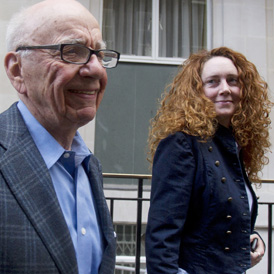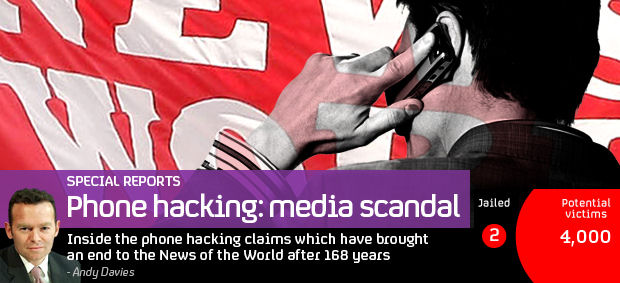News of the World phone-hacking scandal: Q and A
As the News of the World closure fails to quell the phone-hacking controversy at Rupert Murdoch’s News International, Channel 4 News looks at some of the oustanding questions.

Why did the News of the World close?
After 168 years, the last edition of the News of the World (NoW) went to press on Sunday 10 July, containing no commercial adverts and with the promise that all revenue would go to charity.
Headlined “Thank you and goodbye”, the final edition apologised for phone hacking claims which had enveloped the paper, telling readers: “Quite simply, we lost our way.”
The shock closure of Britain’s biggest-selling Sunday paper put 200 staff jobs at risk and came a week after allegations of further hacking by its journalists.
After years of rumours that phone tapping was widespread at the newspaper, NoW admitted intercepting voicemails in April amid pressure from prospective victims.
Who are the phone-hacking victims?
Police have a list of 4,000 potential targets by News of the World journalists. Among them are celebrities, royals, politicians and victims of crime.
At the beginning of July it emerged that the mobile phone belonging to murdered schoolgirl Milly Dowler had allegedly been hacked by Glenn Mulcaire, a private investigator who was jailed for phone hacking in 2007 along with ex-NoW royal reporter Clive Goodman.
The Dowler family were told by police that their daughter’s voicemail messages had been illegally accessed after she went missing in 2002. The deletion of a number of messages on her phone gave her family false hope that she was alive.
The parents of Soham schoolgirls Holly Wells and Jessica Chapman also allegedly had their phones hacked, along with families of the 7 July London bombing victims. Relatives of dead UK soldiers may also have been targeted.
Are any other News International publications involved?
Fresh allegations have come to light suggesting that journalists from News International publications obtained private information about former prime minister Gordon Brown.
Among allegations published by the Guardian, a “blagger” acting from the Sunday Times posed as Brown on six occasions in order to gain information from his bank account. In another incident details from his son’s medical records were obtained by the Sun, who published a story about the child’s cystic fibrosis.
What has been the police response?
Phone hacking is against the law, and the police are currently investigating the extent of the allegations.
The Metropolitan Police have faced criticism for their handling of the case, and in January 2011 they reopened their investigation – dubbed Operation Weeting – to look at “significant new information”.
Officers are also investigating allegations involving cash payments to police by the News of the World in Operation Elveden.
The police have faced questions over the relationship between officers and newspapers, as claims emerge of corruption. Officers have long faced criticism from phone-hacking victims for failing properly to investigate the allegations when they first came to light, and for being too close to the media.
How is Andy Coulson involved?
On 8 July officers arrested Andy Coulson, a former NoW editor and ex-director of communications for David Cameron, and ex-NoW royal editor Clive Goodman, jailed in 2007 for intercepting phone messages. An unnamed 63-year-old man was also arrested.
Andy Coulson – who was NoW editor at the time Goodman and Mulcaire were operating illegally – has previously denied any knowledge of phone hacking at his time with the newspaper. He resigned from the paper saying he took responsibility for an incident that happened on his watch.
His involvement in the scandal has raised questions over the judgement of David Cameron. Coulson resigned from his Downing Street post citing coverage of the scandal after he was interviewed by police as a witness in November 2010.
Cameron has received fierce criticism for standing by his former communications chief. Senior politicians have said warnings to Downing Street about the risks involved in appointing Coulson were ignored.
What is the Government’s response?
Amid public outrage following the revelations regarding Milly Dowler, David Cameron has promised two independent inquiries into phone hacking, which will be headed by a judge.
One will focus on the phone-hacking scandal and the role of the media, while a second inquiry will examine allegations that police took payments from journalists.
However, David Cameron has stressed that any investigations will not get under way until the police have finished their inquiry, which could take two years to complete.
Government and opposition leaders have also called for a new system for regulating the media after perceived inadequacy of the Press Complaints Commission. Questions have been raised over the future of the press, protecting privacy and the right to report freely.

How does the phone-hacking scandal affect the BSkyB deal?
Rupert Murdoch’s News Corporation – the owner of the UK subsidiary News International – wants full control over broadcaster BSkyB, which it already part-owns.
The deal has faced criticism from the media and from politicians who object that Murdoch’s empire would own too much of the British media if the deal went through. As the phone-hacking scandal escalated, critics have said it shows that News Corp is not “fit and proper” to own the broadcaster, as required by media regulator Ofcom.
The decision regarding the takeover rested with Culture Secretary Jeremy Hunt who referred it to the Competition Commission.
Rupert Murdoch’s company withdrew its offer to hive off Sky News as a separate company and said it was now ready to engage with the Commission instead.
This means a delay to the deal of an estimated six to eight months. Analysts suggested the delay is a way for News Corp to keep the bid alive and return to it next year.
In light of the closure of the News of the World and fresh phone-hacking arrests, Hunt has sought fresh advice from Ofcom and from the Office for Fair Trading (OFT) on whether he should refer the bid to the Competition Commission.
After receiving 100,000 submissions to the BSkyB consultation, the Government was already expected to delay the decision until September. Opposition ministers urged Murdoch to drop the BSkyB deal until the police investigation has concluded.
What next for News International?
News International has been co-operating with the police inquiry and is conducting its own investigation into the claims.
Rebekah Brooks (nee Wade) – editor of the NoW at the time of the Milly Dowler phone hacking – has faced fierce calls for her resignation as chief executive of News International.
There has been growing resentment that Brooks has not stepped down over the scandal, despite the closure of the newspaper and the loss of jobs. She has been removed as head of the internal News International investigation into phone hacking.
Rupert Murdoch has stood firm behind Brooks, telling reporters she was his first priority.
Speculation has also suggested that Rupert Murdoch’s son, James, could face prosecution after he admitted misleading parliament, although not deliberately.
Earlier in July, the younger Murdoch acknowledged approving out of court settlements to hacking victims while announcing the closure of the NoW.
In the lead-up to the news that the NoW was to close, a string of major organisations pulled advertising from the paper as the brand became “toxic”.
Shares in News Corporation and BSkyB have been affected amid expectations that the takeover bid could fail.
